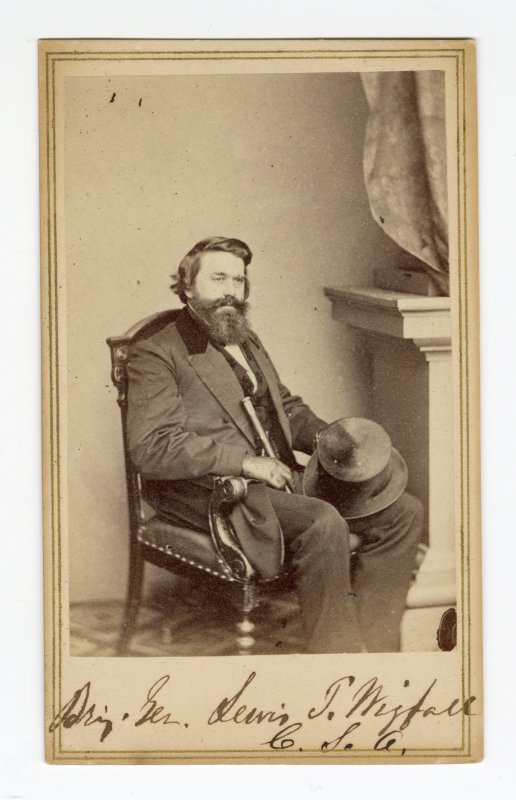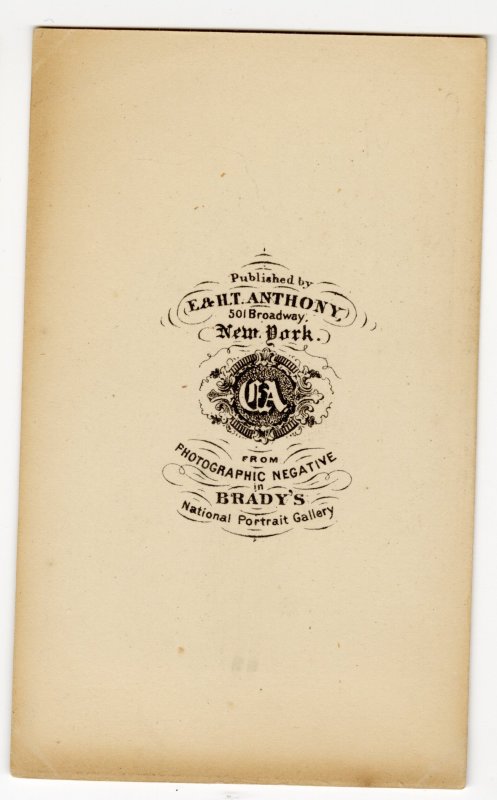1st Texas Infantry - Colonel & General
Item CON-10290
Louis Trezevant Wigfall
RESERVED
Description
1st Texas InfantryCSA General Staff
Colonel & GeneralBackmark: Brady
Signed in period ink
WIGFALL, LOUIS TREZEVANT (1816–1874). Louis T. Wigfall, secessionist, was born in Edgefield, South Carolina, on April 21, 1816, to Levi Durand and Eliza (Thomson) Wigfall and educated at South Carolina College and the University of Virginia. Wigfall believed in a society led by the planter class and based on slavery and the chivalric code. As a young man he neglected his law practice for contentious politics that led him to wound a man in a duel (and be wounded himself) and to kill another during a quarrel. In 1846 Wigfall arrived in Galveston, then moved with his wife, Charlotte, and three children to Nacogdoches, where he was a law partner of Thomas J. Jennings and William B. Ochiltree. Soon Wigfall opened his own law office in Marshall. He was active in Texas politics from the month he arrived, "alerting" Texans to the dangers of abolition and growing influence of non-slave states in the United States Congress. At the Galveston County Democratic convention in 1848 he condemned congressional efforts to prohibit the expansion of slavery into the territories and expressed sorrow that Texas would not take the lead in opposing such unconstitutional actions.
Named in 1850 to the Texas House of Representatives, Wigfall attacked United States Senator Sam Houston as a coward and a traitor to Texas and the South. Wigfall played a major role in organizing Texas Democrats and fighting the American (Know-Nothing) party and Sam Houston in 1855–56. Wigfall was one of the few men in Houston's opposition who rivaled him as a stump speaker, and he was widely credited with Houston's defeat for the governorship in 1857. That year Wigfall was elected to the Texas Senate, and in 1858 he had a strong voice in the state Democratic convention that adopted a states' rights platform. With the breakup of the Know-Nothings, many moderates moved back into the Democratic party, and it appeared that Wigfall`s radicalism was repudiated and that Houston and moderates were ascendant. But Wigfall capitalized on the fear that John Brown's raid on Harper's Ferry caused in the slave states and was elected to the United States Senate in 1859. In the Senate Wigfall earned a reputation for eloquence, acerbic debate, and readiness for encounter. In the forefront of southern "fire-eaters," Wigfall continued his fight for slavery and states' rights and against expanding the power of national government. Nevertheless he tried, unsuccessfully, to get federal funds to defend the Texas frontier against Indian attacks and to build the Southern Pacific Railroad into Texas.
After Abraham Lincoln was elected president, Wigfall coauthored the "Southern Manifesto," declaring that any hope for relief in the Union was gone and that the honor and independence of the South required the organization of a Southern Confederacy. Wigfall helped foil efforts for compromise to save the Union and urged all slave states to secede. He stayed in the Senate after Texas seceded, spying on the Union, chiding northern senators, and raising and training troops in Maryland to send to South Carolina. With the assistance of Benjamin McCulloch, he bought revolvers and rifles for Texas Confederates. Wigfall made his presence felt when the Civil War began at Fort Sumter, rowing under fire to the fort and dictating unauthorized surrender terms to the federal commander. Between April and July 1861, when he was finally expelled from the Senate, Wigfall was a member of the Provisional Congress of the Confederacy, an aide to President Jefferson Davis, and a United States Senator. He was commissioned colonel of the First Texas Infantry on August 28, 1861, and on November 21 Davis nominated him brigadier general in the Provisional Army, a move later confirmed by the Confederate Congress. Wigfall commanded the Texas Brigade of the Army of Northern Virginia (Hood's Texas Brigade) until February 1862, when he resigned to take a seat in the Confederate Congress.
At the beginning of the war Wigfall was a friend and supporter of President Davis. But soon after Wigfall's election to the Confederate Senate they quarreled over military and other matters. During the last two years of the Confederacy Wigfall carried on public and conspiratorial campaigns to strip Davis of all influence. Despite his public advocacy of states' rights, Wigfall did little for Texas. In the Confederacy he worked for military strength at the expense of state and individual rights. But he opposed the arming of slaves and was willing to lose the war rather than admit that Blacks were worthy of being soldiers. After the fall of the Confederacy, Wigfall fled to Texas for almost a year and then, in the spring of 1866, to England, where he tried to foment war between Britain and the United States, hoping to give the South an opportunity to rise again. He returned to the United States in 1872, lived in Baltimore, moved back to Texas in 1874, and died in Galveston on February 18, 1874. He was buried there in the Episcopal Cemetery.
Source: Texas State Historical Association


